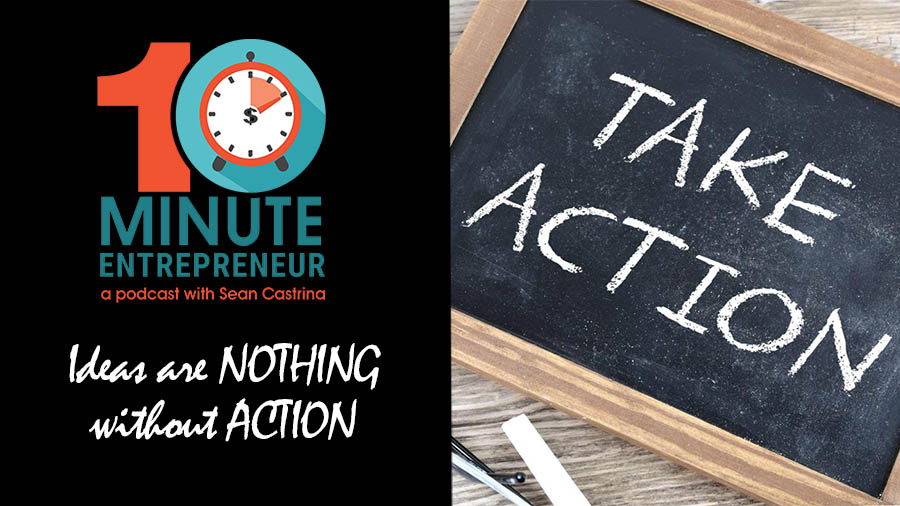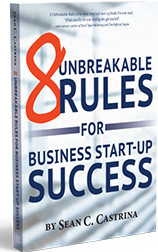Today we are talking about how ideas are NOTHING without ACTION!
Listen, ideas are fine, but if they only sit in your head and you don’t take action on them, they’re just an idea. I want to flesh out an idea.
I’m going to give you what I believe are the six stages of an idea. I believe ideas are great, but I believe that ideas have stages and for them to be good, they’re going to go through these six stages.
Stage 1: The Birth of an Idea
It’s just in your head. Napoleon Hill said, “Ideas are the beginning points of all fortune.” He wrote the book, Think and Grow Rich. So there’s some power in ideas.
So let’s talk about an idea first, It’s BOOM. It’s in your head. It’s in your conscience. You see your subconscious mind, and you’re like, wow, this could be really good.
It’s funny, my kids are kind of trained to know when I have a big idea because I share it. I’m like, this one’s a big one.
One time, my daughter, when we were going through 2008 and the economy pulling back, I had mentioned that we might make some cutbacks. My daughter said, “Oh dad, we just need another one of your great ideas”. So I’m always birthing ideas in my head and in my head, they always seem really, really, good. But…
Stage 2: Contemplation
Then the next stage of an idea is contemplation. This is where you contemplate how good your idea actually is. You get the idea quickly and think it’s good, but now you have to kind of roll it around in your head.
I have to vet it. Is it really good? Sometimes the first day I have it, it seems like it’s really good. And then by the end of the week, it’s not as good as I thought. I like kind of like what Arthur Clark said. He said, “New ideas passed through three periods. First, it can’t be done. Next, it probably can be done, but it’s not worth doing. And then third, I know it was a good idea all along.”,
In the beginning, I used to always think my ideas were all winners, and now I sadly have to admit they’re not all winners.
Stage 3: Expose It to Criticism
I need to take it out of my mind. I need to take it out of just me looking at it, and I need to expose it to criticism, to critiquing by other people.
I don’t believe in bringing all your ideas to everybody, you know. I don’t bring ideas to people that are negative. I don’t bring ideas to people that wish me to fail, and let me let you on a fact. You got a lot of family members who would love for you to fail. You got friends that would love for you to fail. Why? Because if you succeed, then you make them look bad.
That’s it. So I expose my ideas to people that I really think are smart enough to critique the idea. They’re just smart people. Maybe they experience in the area this idea is in, maybe the industry or the business I want to put this in, or just the investment opportunity that I see.
Sometimes it’s a book idea that I’m going to bounce off some other author friends that I have, but I want to expose it to criticism from people that can actually help me. If they criticize it, it’s valid. It’s not personal.
Stage 4: Create a Strategy
I have to create a strategy to make it work. I put the idea at the top of a sheet of paper, and I just write everything that would have to take place for this idea to become a reality.
- Who am I going to need?
- How much is it going to cost?
- How long will it take for it to happen?
Remember, I started with just an idea. I birthed an idea, just an idea, boom in my head. That’s great. But that’s just the beginning point. Then I contemplate it. This is when I want to bang it around and vet things.
I kind of have a formula:
- Can I get it up within a year?
- Is it going to cost too much?
- Can I put a team together to help me on this idea?
- Will this idea further an existing business I have?
- Will it take from an existing business of mine?
- Is it sustainable?
- Is this just a trend?
Stage 5: Implement It
I implement and execute the idea. I either implement it in something I’m working on or I need to execute it from beginning to end. I like what Ashley Brilliant said. “Good ideas are common. What’s uncommon are people who work hard enough to bring them about”.
People ask say to me, “how did you start 20 businesses?”
One at a time.
I wrote books, one page at a time. I invested in real estate one deal at a time.
Stage 6: You Pivot the Idea
You have to execute on the idea, and then there’s an adjustment or the pivot point.
So you get an idea, you think it’s great, you put it on the field, but I have found there’s always an a moment you didn’t see something coming. You needed to make an adjustment, you needed to make a pivot, and that’s typically what allows the idea to survive and thrive. If you don’t make that pivot, it won’t survive and it will not thrive. I know there’s going to be a pivot point because I’ve learned to make that change.
That change is just a part of the evolution of an idea. There’s going to be something that I learned that I didn’t quite count on.
I love ideas and I’m an idea machine, but I don’t run on all of them. I have smart people around me that can put an idea to bed fairly fast. I contemplate it, vet it by asking some questions, expose it to criticism, create and implement a strategy for it, and finally, pivot.


